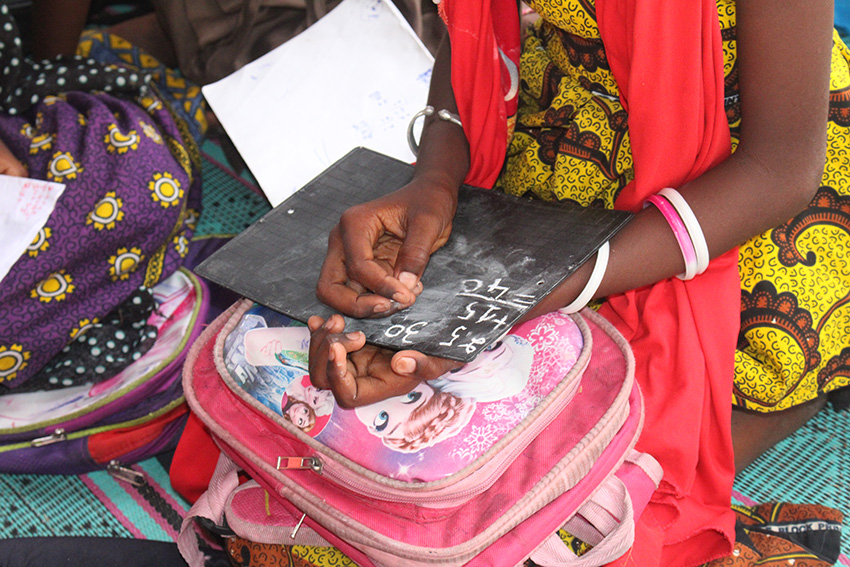
A girl solves a math problem during a lesson in Medina Gounass, Senegal. Photo credit: Nianthio Pro for FHI 360
In both ordinary times and times of crisis, one of the best ways to tackle many of the issues facing the world today — from poverty to gender-based violence to climate change — is to provide primary school-aged girls with a quality education. Despite this, some 122 million girls worldwide are out of school. Too many girls and women are held back by bias, social norms, and expectations influencing the education they receive and the subjects they study. Around the world, 120 million girls — one in 10 — under the age of 20 have experienced sexual violence. Bullying, including gender-based bullying, is a common form of violence taking place in schools. We know that these trends are made worse by the impact of crisis, conflict and climate change on women and girls.
While development professionals and education experts have long focused on the challenges and solutions to helping girls access and stay in school, not enough has been done to examine the source of gender disparities in the classroom and root them out.
At FHI 360, we partner with thousands of committed educators and community leaders to provide safe, inclusive and equitable learning environments in schools. We know that the most difficult and often intangible barriers are the harmful gender stereotypes and disparities that are embedded in learning spaces and reinforced — rather than reshaped — by teaching and learning practices. Gender-responsive pedagogy (GRP) is a teaching and learning practice that includes taking action to correct or prevent gender bias, discrimination and violence to ensure gender equality and equity.
GRP encompasses learning materials, instructional activities, language use, classroom setup and interactions, and assessment of student performance. Teachers can also socialize classroom work and approaches with caregivers, which may help influence gendered attitudes and beliefs. GRP is one element of a holistic approach to gender equity, but it is proving to be an important piece of the puzzle. In one study in Ethiopia and Tanzania, schools that adopted GRP experienced a 10% improvement in girls’ retention and academic performance.
Moreover, in some countries, boys withdraw before completing school due to gender expectations about masculinity and pressure to earn a living from a young age. GRP means recognizing and addressing the issues that affect both girls’ and boys’ access to, retention in and completion of education.
Evidence shows that gender norms are internalized at a very young age, so intervening early — that is, when students are in pre-primary and lower primary school — is vital. For example, in Rwanda, under the USAID Tunoze Gusoma activity, FHI 360 is working with the Ministry of Education to integrate GRP into pre-primary and lower primary schools through teacher professional development, reflective teaching practices, school-level learning circles for teachers, and simple tips and checklists. Positive, culturally meaningful, and developmentally appropriate messages for children and school staff about gender are integrated into the program.
GRP is not limited to the learning space, nor is it the sole task of the teacher. It is a multifaceted approach in which everyone has a role to play in contributing to the solution: leaders, policymakers and champions at the top of the education system; inspectors and pedagogical advisors who are the key links to school staff; and formal and non-formal coaches. Community dialogues are opportunities for parents, teachers and community members to reflect together on cultural norms and educational goals.
GRP can result in improved access, retention and learning outcomes, especially when taken with other measures. These include offering scholarships, providing mentoring for girls and young women, ensuring that schools are safe from gender-based violence, working with local organizations to challenge harmful gender stereotypes, prioritizing students’ social-emotional development, and ensuring schools are disability inclusive.
Gender-responsive pedagogy can be particularly important in times of fragility: It is the first line of defense against gender-based violence. In the eastern Democratic Republic of Congo, FHI 360 has organized clubs and camps to promote gender equity in communities as well as camps for internally displaced people. We have also formed and trained school gender committees to help prevent school-related gender-based violence and strengthen referral networks for survivors of gender-based violence. High-quality programs that promote GRP prioritize teaching male and female learners and educators about sexual and reproductive health and rights, thereby reducing the incidence of GBV and improving inclusion.
Pedagogy that is responsive to gender challenges and opportunities benefits not just students but all of society. And it takes all of society coming together — recognizing and challenging the bias, social norms and expectations that influence us — to ensure that education is within reach for everyone, everywhere.
